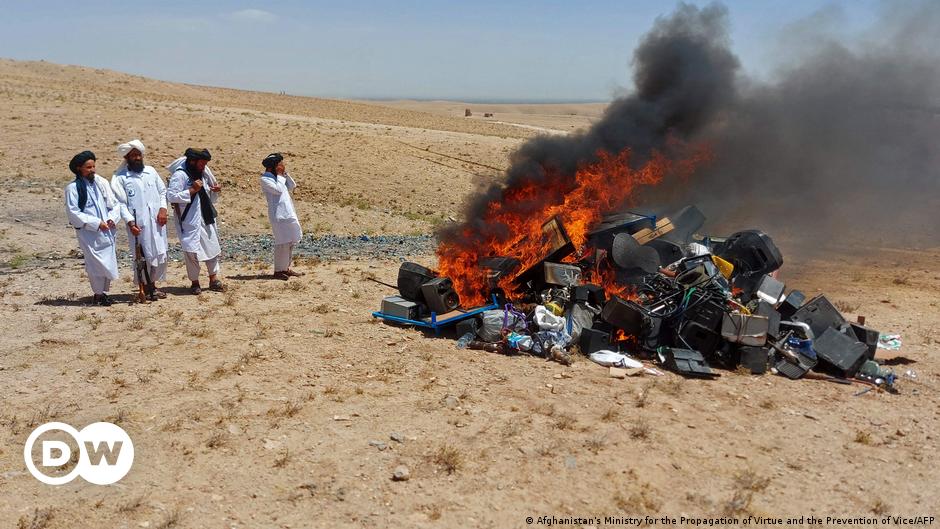Taliban’s religious police reportedly burned a number of musical instruments in the western province of Herat, according to a Sunday report by the state-run news agency Bakhtar.
Sheikh Aziz al-Rahman al-Muhajir, the provincial head of the Ministry of Promotion of Virtue and the Prevention of Vice, said music led to “misguidance of the youth and the destruction of society,” according to the report.
People could be corrupted, according to the official. The Taliban banned nonreligious music the last time it ruled the country in the 1990s.
Pictures show officials gathered around a fire with musical instruments, including guitars, harmoniums and speakers. A pile of musical instruments burn as the Taliban imposes new restrictions on music

Afghanistan has a strong musical tradition, influenced by Iranian and Indian classical music.
It also has a thriving pop music scene, adding electronic instruments and dance beats to more traditional rhythms.
Both flourished in the past 20 years before the Taliban stormed to power in 2021.
But the Taliban has imposed harsh measures since seizing control of Afghanistan in August 2021 as US and NATO forces withdrew.
Students and teachers of the Afghanistan National Institute of Music, which was once famous for its inclusiveness, have not returned to classes since the Taliban takeover. Many musicians have also fled the country.
Taliban’s crackdown on women’s rights
The Taliban promised a more moderate rule than that of their previous time in power in the 1990s. They had promised to allow for women’s and minority rights. But instead, they reintroduced harsh measures in line with their strict interpretation of Islamic law, or Sharia.
They have carried out public executions, banned education for girls beyond the sixth grade and also banned women from most forms of employment.
Earlier this week, the Taliban announced that all beauty salons ought to be closed because they offered services forbidden by Islam and caused economic hardship for the families of grooms during wedding festivities.



Sorry, I’m bad at math (even though it was a rhetorical question) 😃
I’d like to point out however, that while having 4 wives might be allowed in some branches of Islam, there are others where this is not the case. So while Taliban might allow it (and I don’t know whether they do as I am not an expert, but I’m currently too lazy to check it out), not everyone in the Muslim world does.
I say this because us living in the west have a very limited view of Islam and generally it is bad to enforce stereotypes. So this was not aimed against you, just pointing out something that bothers me in general 🙂
Removed by mod
Yes, in fact there are many different types of Islam followed in different countries. America is not unique in that way. Even within many Muslim countries there are different sects of worshippers. Not everyone follows the mainstream interpretation.
I certainly don’t think that, nor does anyone with any common sense. As well as no one should consider Christianity, Judaism, Hinduism or even Buddishm as completely peaceful. Every religion has built within it a framework that can be used to promote and justify violence.
I don’t understand how rest of your post relates to what was said before, but I than you for the info you provided.
Here’s a more detailed info about polygamy in different countries: https://www.pewresearch.org/short-reads/2020/12/07/polygamy-is-rare-around-the-world-and-mostly-confined-to-a-few-regions/
Holy crap I didn’t realize it was accepted so much in the Pacific. That’s crazy.